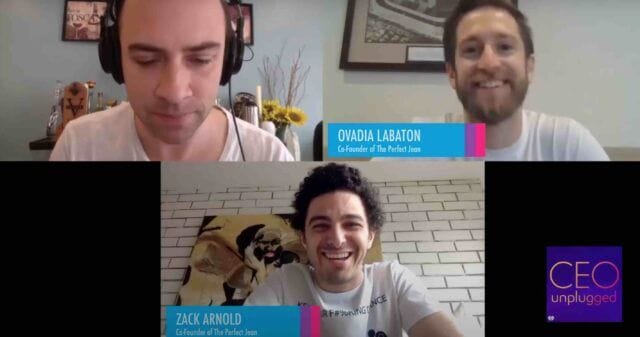
The Perfect Jean was founded in 2019 in New York City by Zack Arnold and Ovadio Labaton, two men who worked in and around the apparel industry. The brand is all about simple, no-frills jeans in various fits and sizes, catered to male customers. It stemmed from their dislike of bulky khakis.
Everyone has an option. Bigger guys have choices from the athletic collection. The bootcut collection will cater to those who enjoy hiking and wearing cowboy boots. The slim fit sits low on the waist and is made with a 22% elasticity effect. The slim thick is for those who cannot decide whether to go for an athletic cut or a slim cut.
While simplicity is emphasized, The Perfect Jean NYC promises to deliver jeans that surpass expectations in terms of comfort and fit, be it slim, athletic, straight, or skinny fit. The Perfect Jean NYC seems to segment its market to a segregated group–men who care about the comfort and fit of their jeans.
It also claims its product’s durability with normal use and seems to campaign for sustainability. But how sustainable are they really? Let’s dig in.
Is The Perfect Jean NYC fast fashion?
So far, we have not identified any signs of a fast-fashion business model. Their collections seem to be curated and selected based on various categories, such as fit, materials, and color. There are no indicators or reports that they intentionally produce their items excessively.
However, whether or not the brand is fast fashion, the question remains: How ethical and sustainable are they?
Is The Perfect Jean NYC sustainable?
Let’s take a look at their environmental impact…
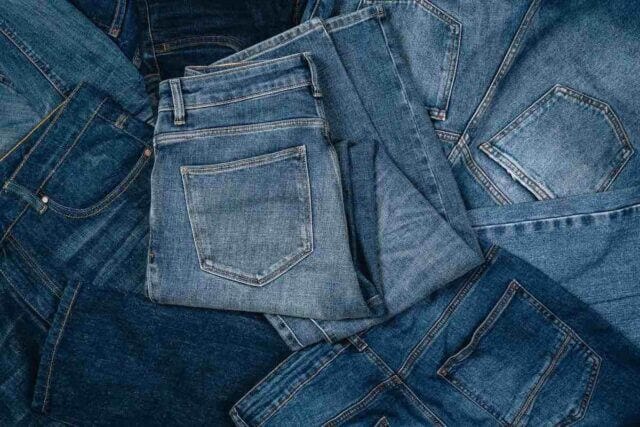
What materials does The Perfect Jean NYC use? What type of cotton?
As we mentioned, the brand also curates its collection based on materials, among other categories. They offer a Premium 99% Cotton collection, which caters to those who want natural fiber and a more conventional denim style that is just as comfortable and long-lasting. Think about the equivalent of Levi’s 501. The rest of the 1% is spandex to allow some movement.
What about other collections? Their flagship collection, the OG Stretch, claims to be extremely soft and flexible for optimal comfort, hence the additional 1% spandex in its composition. Unfortunately, this stretchy collection is compensated with a blend of 30% polyester and less than 70% cotton. Similar to the OG Stretch collection, the DenkhakiTM collection uses 70% cotton blended with 20% polyester. Such blends do not really reflect conscious design and, hence, lower circularity and long-term quality!
Perhaps they do it for comfort or structure? Or perhaps to cut costs? Who knows? But if they truly advocate for sustainability, we expected at least some certified textiles. Most of their fabrics are not sustainable.
We did find some good news. Their hoodies and crew-neck t-shirts are partly made of organic cotton, which looks promising as they are made of GOTS-certified materials. Some jean collections also use BCI cotton and recycled materials (no evidence whether they are certified, though!), but again, they are not consistently used in the entire collection. We hope they will extend the sustainable fabrics to other collections!
Is The Perfect Jean NYC carbon neutral? Do they have any climate targets?
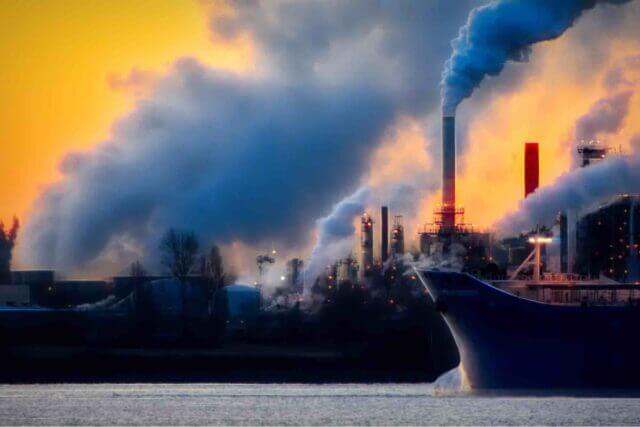
We found absolutely nothing about emissions reduction goals, let alone strategies, regarding climate change. Has The Perfect Jean NYC taken any steps to reduce greenhouse gas (GHG) emissions from the production of the majority of its products? Unfortunately, no. There is no mention of collaboration with suppliers or facilities to use energy-efficient manufacturing technologies, renewable energy, or carbon offsets.
We even tried searching on Google using the brand name and various keywords, but we got nothing. Talking about being carbon neutral is still a long, long way to go for The Perfect Jean NYC.
We expected at least The Perfect Jean NYC could start by measuring their Scope 1 and 2 emissions and then start assessing their suppliers to enable them to measure their Scope 3 emissions. For example, they could start addressing issues within their core business in New York City by increasing their HQ’s energy efficiency. Then, they could move on to measuring their waste impact, supply chain, and production impact on climate change.
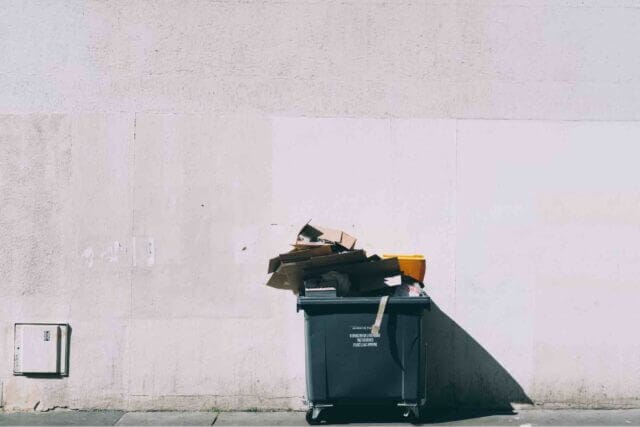
Unfortunately, this is not the case since the brand does not participate in voluntary reporting, targets, or joint initiatives (e.g. the Fashion Industry Charter for Climate Action).
Does The Perfect Jean NYC have a clothing recycling program? Let’s judge their circularity efforts.
Unfortunately, no. From our observation, the closest thing the brand is doing to circularity is providing two options for garment care: the lazy or low-maintenance way or the high-maintenance way–which we think is the bare minimum.
Other than that, we can’t find any evidence of whether they have a recycling program. If they are a little bit creative, they could offer a separate marketplace on their website for secondhand jeans. For example, Outerknown, one of a few fantastic brands that passed our assessment, is great at implementing the secondhand marketplace.
Another great initiative to kick-start a recycling program would be a take-back scheme. Brands are expected to provide a platform for their customers to recycle their old clothes. These garments can be of their own brand or even other brands.
Read more about the take-back scheme and other brands that actively participate in recycling efforts and circular economy: Top Fashion Brands Recycling Clothes You Should Know
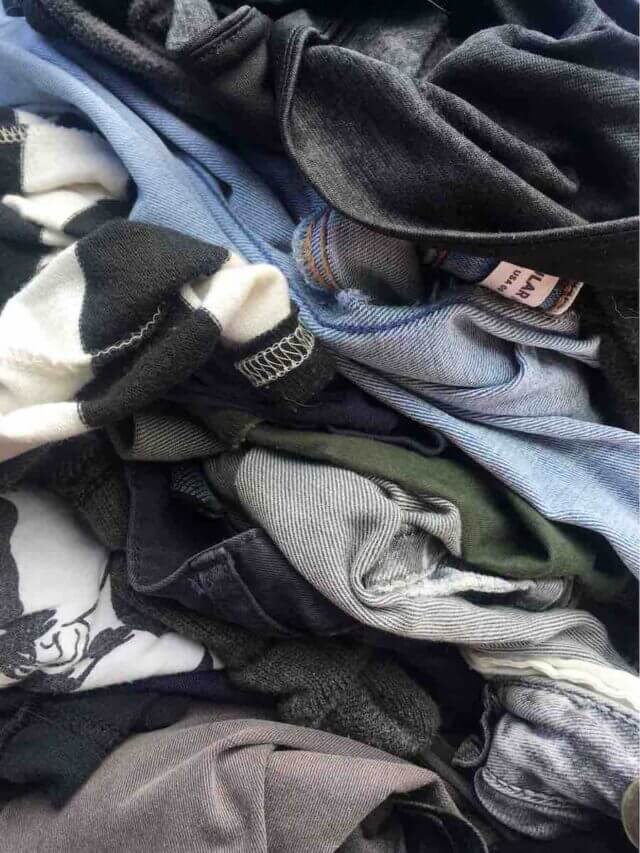
Is The Perfect Jean NYC ethical?
Let’s take a look at their social impact…
Where are The Perfect Jean NYC clothes made?
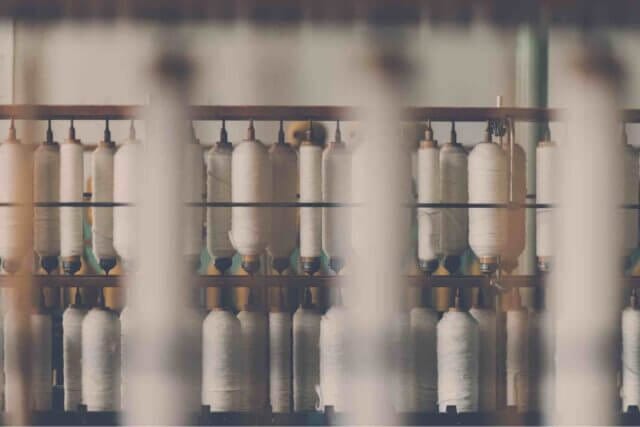
According to their FAQ, their yarn is from Brazil, their fabric is woven in China, and the jeans are manufactured in Bangladesh. The Perfect Jean NYC states that for each of their supply chain partners, their internal staff arranges independent audits and inspections. However, to learn why audits aren’t enough, check out this podcast episode from Articles of Interest.
They also state that all of their factories are ILO, GOTS, and SEDEX certified, but it’s unclear which factories have which certifications. It’s also unclear if any of their clothing makers earn living wages, which means you can certainly bet that they don’t.
Unfortunately, we found no audit reports, code of conduct for suppliers, or any other references to labor standards being published. We have no idea what they mean by “every” factory–does it extend to Tier 2 manufacturers? We also don’t know how often and how regularly their factories are assessed. Also, we don’t identify any initiatives in engaging with their suppliers, such as, for example, suppliers’ surveys or labor unions.
Again, transparency–or an attempt to achieve it–doesn’t always mean sustainable or ethical. First of all, this brand doesn’t do it correctly as they don’t publish their factory list or other audit documents, for example. Second, the countries they mention may become a two-edged sword for themselves. For example, some BCI Cotton fabrics are allegedly associated with deforestation in Brazil, around the south of Amazon. We hope this is not true, but there is a possibility that this brand’s supply chain might directly or indirectly touch the subject of forced labor involving about 1.8m Uighur, Turkic and other Muslim people in Xinjiang, China. As we understand, about 90% of cotton from China comes from this region.

And don’t get us started with Bangladesh again. There has long been a history of fatal workplace accidents in Bangladesh’s apparel sector. Significant advancements have been made with the establishment of the Accord on Fire and Building Safety in Bangladesh following the horrific Rana Plaza factory collapse in 2013. But the problem is, The Perfect Jean NYC is not one of the Accord’s signatories!
Indeed, it is unfair to generalize about the whole country. Ethical textile manufacturing initiatives do exist in Bangladesh, such as those supported by the Ethical Trading Initiatives. Unfortunately, we can’t find any evidence linking them to such initiatives.
Is The Perfect Jean NYC vegan and cruelty-free?
At least, this is an easier answer to provide. We don’t identify any products coming from animal-derived materials such as wool and leather. If they plan to do it sometime in the future, they must write a policy on sourcing animal-derived materials. So, it is safe to say that the brand is cruelty-free… for now. However, without a certification, you can’t say for sure if the brand is vegan.
Are you curious about vegan-friendly fashion? Check out: Our Guide to Vegan Fashion.
The Perfect Jean NYC Sustainability Rating
Now that we’ve talked about their sustainability let’s see how they performed in our criteria…
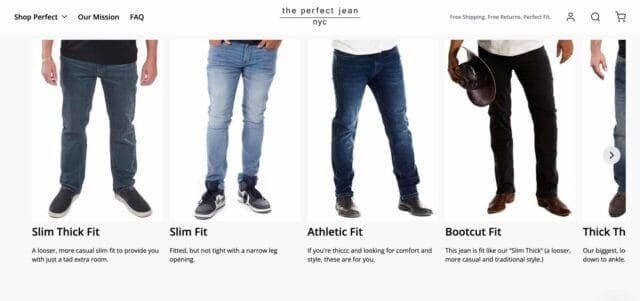
Transparency: 0/14
Given that they claim “We’re Transparent and Have 25+ Years of Manufacturing Experience” zero points in this category doesn’t bode well for their integrity.
We appreciate that The Perfect Jean is trying to be sustainable, but they are going in the wrong direction. If they disclosed their supply chain, took steps to improve their product traceability, and implemented social/environmental programs in their entire manufacturing facilities, they could achieve much better transparency.
However, even though they look like they did the job, they are really far from being transparent.
Fair Labor: 3/33
The Perfect Jean NYC seems to be starting to do the right thing by ensuring ILO accreditation and SEDEX audits across its factories. However, we have no idea if they take these measures beyond Tier 1 factories. Feedback from workers, initiatives to improve their well-being, or promoting unions are all things they don’t do.
When it comes to living wages for clothing makers, a category where most brands underperform, The Perfect Jean NYC also underperforms. They offer zero evidence that anyone in their supply chain earns a living wage.
We also couldn’t find any code of conduct for their suppliers, so we are not convinced they uphold a high fair labor standard in their supply chain.
Sustainably Made: 2/49
We have encountered a few sustainable materials in their collection, including BCI Cotton, GOTS organic cotton, and recycled polyester. However, they don’t disclose the percentage of sustainable materials used compared to their entire collections. Also, unnecessary fabric blends may degrade their durability and circularity.
They don’t state any goals for achieving a certain level of sustainable materials or even assessing their materials’ environmental impact. For example, conventional denim dyeing uses harmful chemicals that potentially harm water, soil, and the ecosystem.
We also expected more from their circularity initiatives. We didn’t identify any take-back schemes, resale forums, or denim repairs. We thought at least they would offer the latter service for a brand that exclusively sells denim.
DEI: 0/4
Another disappointment here. There is zero information on diversity within the brand’s executives, nor a commitment to diversity and inclusion. Not even a DEI policy on their career page.
Our Principles: -20
Here at Eco-Stylist we rely on these 3 principles to judge whether a brand is a sustainable fashion pioneer. After looking through what they have done within the fashion industry, it is very safe to say that The Perfect Jean NYC isn’t a leader.
- Is the brand fast fashion? They are safe at this point as the brand is relatively new, produces lower volumes of collections compared to typical fast fashion, and seems to cater for a niche market. We deduct no points since they are not a fast fashion brand.
- Does the brand inspire us? Definitely not in terms of sustainability or ethics. This earned them -10 points.
- Do we trust the brand? They claim to be transparent and yet offer no transparency. We gave them -10 points here too.
The Perfect Jean NYC’s Overall Score: -15
The Perfect Jean NYC thought they could get away with sprinkling and name-dropping some assessments, audit criteria, and certifications on their website. Unfortunately (for them, not for you), we are not fooled by their greenwashing. This is why we scored them -15.
Ethical Alternatives to The Perfect Jean NYC
At Eco-Stylist we certify many denim brands that are a LOT more ethical and sustainable than The Perfect Jean NYC. Here’s some of our favorites.
1) Nudie Jeans
Rating: Gold
To last a lifetime, denim products indeed need superior materials to survive. Nudie Jeans does this really well. Emphasizing their preference for organic cotton, Nudie Jeans are one of our favorite denim brands. They are also really big on transparency and traceability! They know their suppliers in the supply chain–from the raw materials, yarn and fabric process, trims, manufacturing, suppliers, transportation, and even warehouse!
They even measure the climate and water impact of each product! The bar is so high. And they even offer free repairs for life.
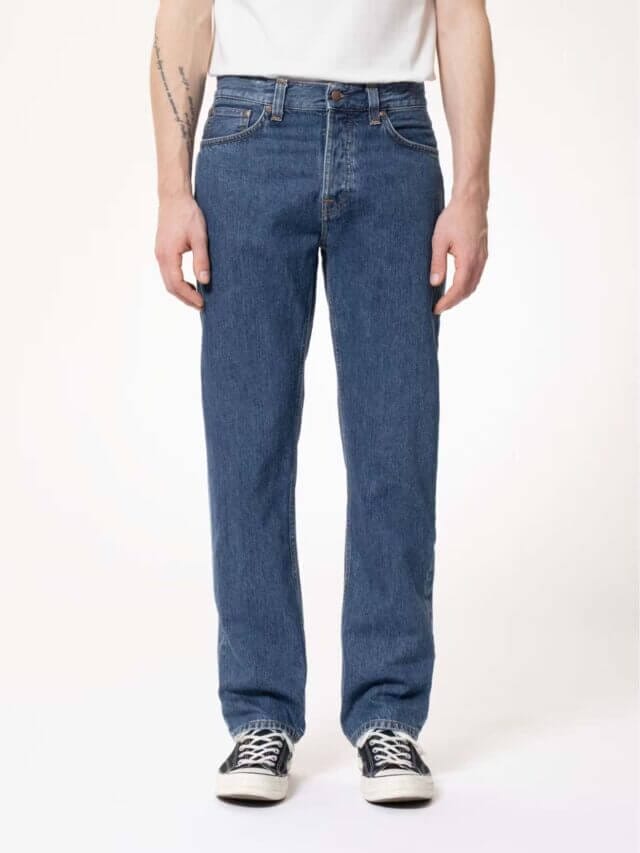
2) MUD Jeans
Rating: Gold
MUD Jeans are the definition of being detail-oriented when it comes to transparency. They even mention which factory their products are manufactured in. They also use mostly sustainably certified materials. Even their elastane is certified!
As one of the most circular denim brands, MUD jeans contain up to 40% post-consumer recycled denim. And interestingly, they also offer a denim leasing service. For a nominal monthly charge, customers can lease jeans. After a year, they can choose to keep the jeans, return them, or exchange them for a new pair.
What else can you ask for?
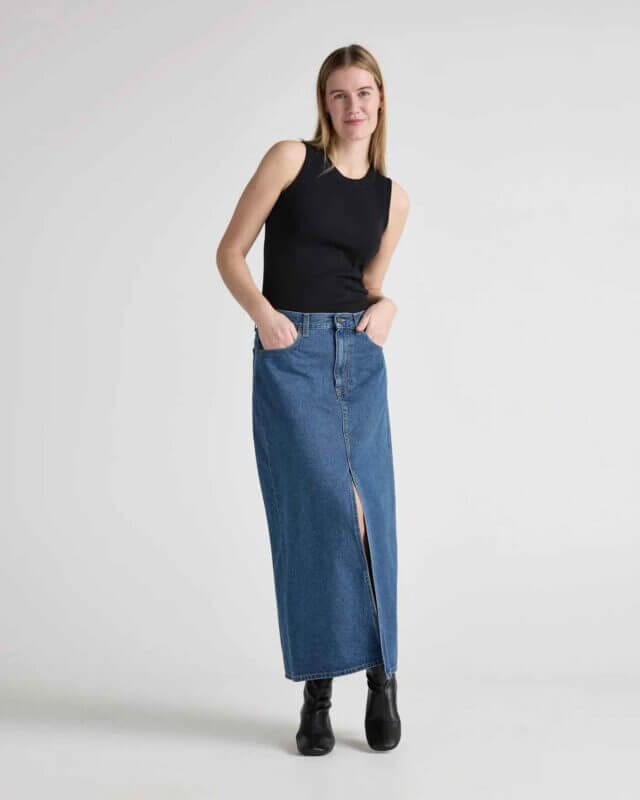
3) Kuyichi Pure Goods
Rating: Gold
Their adventure began in 1998 in Peru, in South America. While researching the Peruvian cotton business, the founders of Kuyichi, the NGO Solidaridad, were astounded by the pollution and poverty they witnessed. Solidaridad began working with nearby cotton farmers, rewarding them and everyone else in the supply chain for their efforts.
Kuyichi also seems to invest a lot in sourcing responsible materials and ensuring safety in their production. Judging from their reports and sustainable material list, they are hungry for more innovation in sustainable materials and production. Also, they publish supplier lists on their website after signing the Transparency Pledge. The Open Apparel Registry, an online database containing all publicly accessible supply chain data, has also received this list.
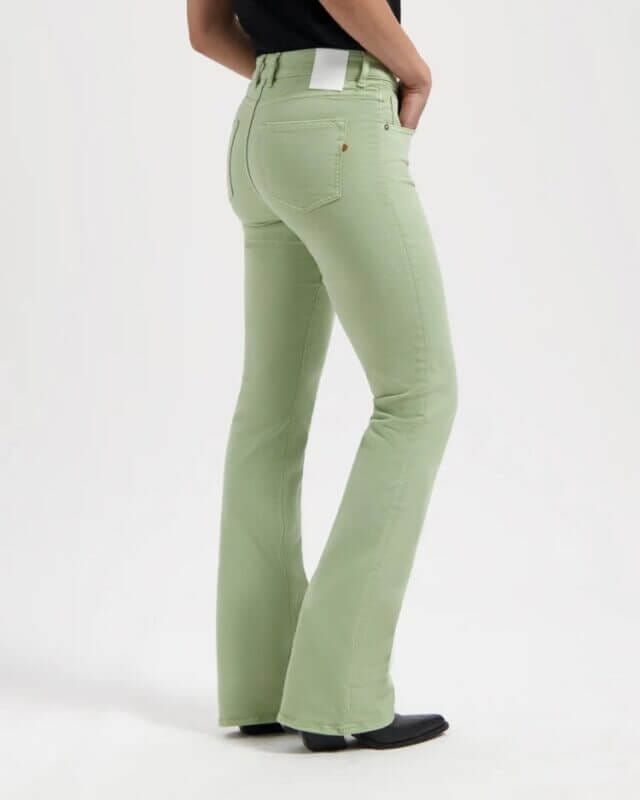
4) Outland Denim
Rating: Gold
Outland Denim produces premium denim in various fits and cuts for both men and women. It is Australia’s first B corporation, founded to make a positive impact on human trafficking.
They launched the Sag Salim supply chain communications initiative in collaboration with Precisions Solutions Group (PSG), IN2 Communications, Bossa, and Nudie Jeans Co. to reach out to Turkish cotton farm laborers. They have also created a strategy and policy for responsible purchasing to provide a set of standards of ethical and responsible behavior. The policy’s foundation is based on the Ethical Trading Initiative Guide to Buying Responsibly.
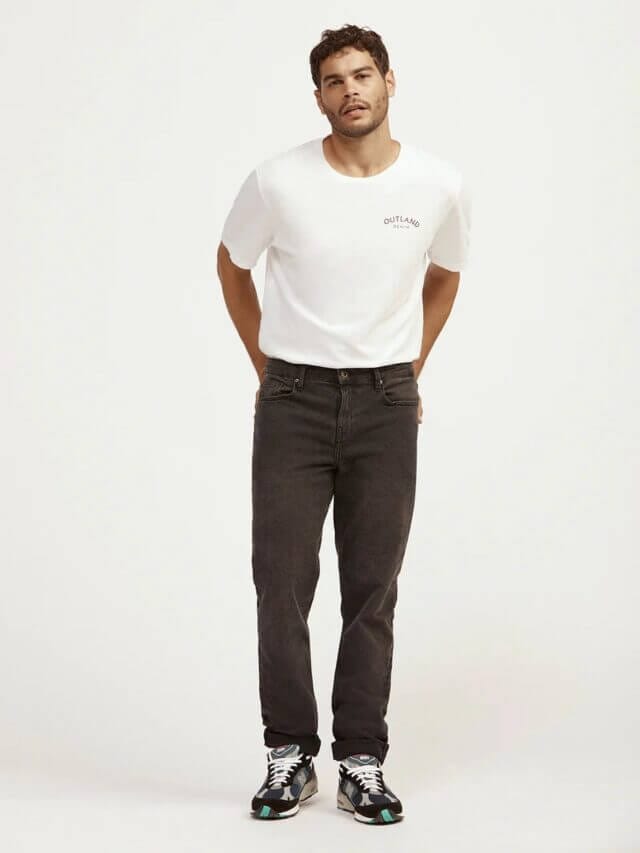
5) Unspun
Rating: Certified
Unspun is now working on optimizing the use of 3D hardware technology to reduce world carbon emissions by 1%. It also aims for Fair Trade accreditation. Transparency and fair labor are in the vein of their business. They provide a list of suppliers in their supply chain and audit their factories monthly to ensure good working conditions. In addition, they prioritize sustainable materials that adhere to strict international standards such as the GOTS, OEKO-TEX, and ISO standards.
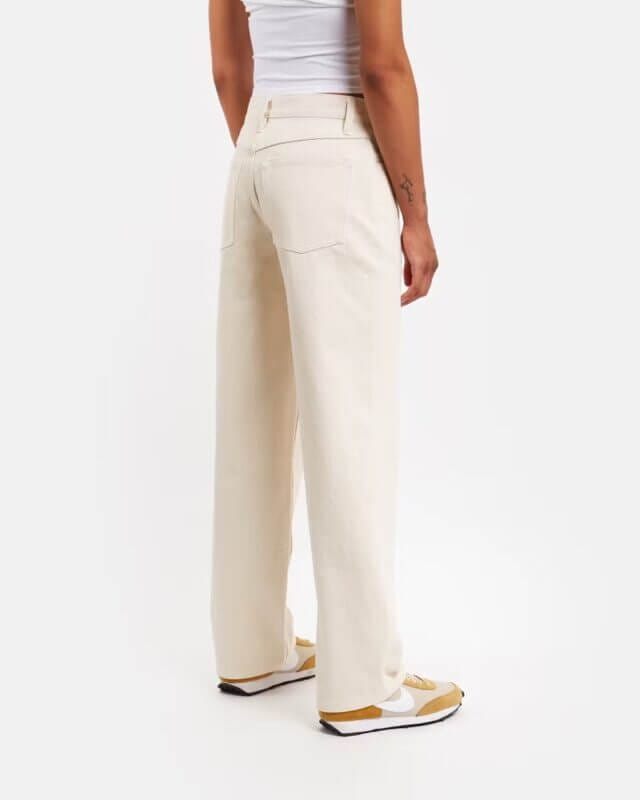
Looking for more ethical and sustainable denim?
Check out our brand guide! You can filter by denim brands to discover over 27 certified brands to shop jeans that are better for clothing makers and the planet.
Mariana previously worked in various sustainability and climate change research and consultancy projects in Indonesia and the UK. Currently working in the tourism industry, she wishes to gain more unique skills and meet different people from around the world.









